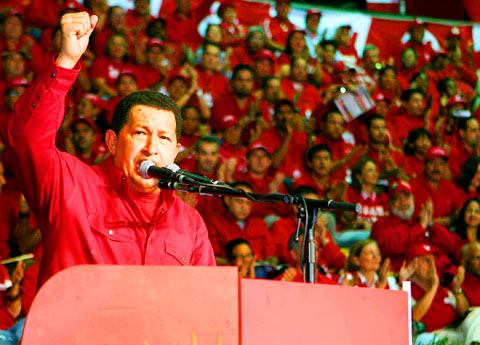Venezuelan President Hugo Chavez said on Sunday that he was interested in accepting Russia’s offer of help in developing a civilian nuclear power program.
“We certainly are interested in developing nuclear energy, for peaceful ends of course — for medical purposes and to generate electricity,” he said.
“Brazil has various nuclear reactors, as does Argentina,” he said.

PHOTO: AFP
“We will have ours as well,” he said upon his return from a tour in China and Russia.
His remarks followed comments from Russian Prime Minister Vladimir Putin in Moscow on Thursday that Russia was “ready to consider the possibility” of nuclear energy cooperation with Caracas.
Moscow and Caracas have boosted ties in recent weeks following sharp US criticism of Russia’s incursion into Georgia, with Moscow dispatching long-range bombers and warships to Venezuela for exercises near US waters.
During his global tour, Chavez forged key military and energy cooperation deals that analysts said seemed likely to put him on dangerous footing with the US.
Russia’s energy ministry announced that the two countries would also form a consortium to invest tens of billions of dollars in oil and gas projects in the South American country.
Venezuela is the world’s ninth biggest producer of oil, 2004 US government figures for 2004 show, and is a major supplier to the US.
But Venezuela’s extensive gas reserves are believed to be underdeveloped, with all of the 30 billion cubic meters that Venezuela produces every year used domestically.
Russia is the second biggest oil exporter in the world and controls a quarter of global reserves of natural gas.
Chavez last week also visited France, Cuba and Portugal, but said the Russian leg of his world tour was particularly fruitful, especially his talks with Putin, with whom he said he forged “a profound friendship.”
“I have to thank Putin for his courage in supporting Venezuela, as well as [Chinese President] Hu Jintao [胡錦濤], for not yielding to pressure from anyone,” he said, in an apparent reference to the US.
Chavez has said recently that he has increased ties with Russia as a counter-balance to US power and alluded to that goal again on Sunday.
“The Russian fleet has already departed ... and should arrive in Venezuela at the end of November for maneuvers to increase our defense capability,” he said on Sunday.
“We are not going to invade anyone, or engage in acts of aggression toward anyone,” the Venezuelan leader said.
“But no one should mistake our intention — we are prepared to do everything necessary to defend Venezuelan sovereignty,” Chavez said.

Drug lord Jose Adolfo Macias Villamar, alias “Fito,” was Ecuador’s most-wanted fugitive before his arrest on Wednesday, more than a year after he escaped prison from where he commanded the country’s leading criminal gang. The former taxi driver turned crime boss became the prime target of law enforcement early last year after escaping from a prison in the southwestern port of Guayaquil. Ecuadoran President Daniel Noboa’s government released “wanted” posters with images of his face and offered US$1 million for information leading to his capture. In a country plagued by crime, members of Fito’s gang, Los Choneros, have responded with violence, using car

The team behind the long-awaited Vera Rubin Observatory in Chile yesterday published their first images, revealing breathtaking views of star-forming regions as well as distant galaxies. More than two decades in the making, the giant US-funded telescope sits perched at the summit of Cerro Pachon in central Chile, where dark skies and dry air provide ideal conditions for observing the cosmos. One of the debut images is a composite of 678 exposures taken over just seven hours, capturing the Trifid Nebula and the Lagoon Nebula — both several thousand light-years from Earth — glowing in vivid pinks against orange-red backdrops. The new image

CYBERCRIME, TRAFFICKING: A ‘pattern of state failures’ allowed the billion-dollar industry to flourish, including failures to investigate human rights abuses, it said Human rights group Amnesty International yesterday accused Cambodia’s government of “deliberately ignoring” abuses by cybercrime gangs that have trafficked people from across the world, including children, into slavery at brutal scam compounds. The London-based group said in a report that it had identified 53 scam centers and dozens more suspected sites across the country, including in the Southeast Asian nation’s capital, Phnom Penh. The prison-like compounds were ringed by high fences with razor wire, guarded by armed men and staffed by trafficking victims forced to defraud people across the globe, with those inside subjected to punishments including shocks from electric batons, confinement

Canada and the EU on Monday signed a defense and security pact as the transatlantic partners seek to better confront Russia, with worries over Washington’s reliability under US President Donald Trump. The deal was announced after a summit in Brussels between Canadian Prime Minister Mark Carney and European Commission President Ursula von der Leyen and European Council President Antonio Costa. “While NATO remains the cornerstone of our collective defense, this partnership will allow us to strengthen our preparedness ... to invest more and to invest smarter,” Costa told a news conference. “It opens new opportunities for companies on both sides of the